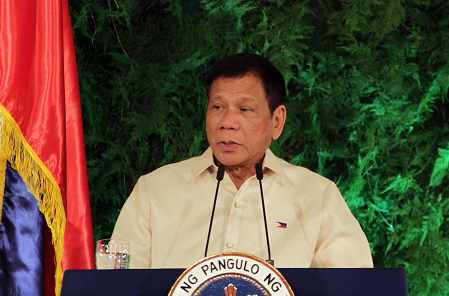
President Rodrigo R. Duterte has given his go-ahead to implement economic managers’ plan to do 24/7 work on infrastructure projects, alongside a faster rollout of public-private partnership (PPP) projects. FILE PHOTO
President Rodrigo R. Duterte has given his go-ahead to implement economic managers’ plan to do 24/7 work on infrastructure projects, alongside a faster rollout of public-private partnership (PPP) projects.
Budget Secretary Benjamin E. Diokno told reporters Tuesday they already brought to the President’s attention the proposal to do nonstop work on vital infrastructure in and out of Metro Manila. “It’s okay with him [Duterte],” Diokno said.
The Budget chief said the government loses P2.3 billion a day to delayed implementation of infrastructure projects.
The government plans to raise to 5.2 percent of the gross domestic product (GDP) its expenditures on infrastructure by next year, as Diokno lamented that the sector has been neglected in the past.
READ: Duterte admin to hike infrastructure spending to up to 7% of GDP
Diokno said “all major projects” amounting over P10 million would be included among those to be worked on 24/7.
The Budget chief admitted that working on infrastructure projects nonstop would initially be costly but he pointed out that there are already advanced technologies that can be tapped to lessen the hassles to be caused to the public, citing for instance a technology that reduces noise.
For his part, Finance Secretary Carlos G. Dominguez III pointed out that the country is “playing a lot of catch up” in terms of infrastructure development, especially amid robust vehicle sales despite the lack of roads and highways.
The Finance chief noted that the plan to give the President emergency powers to address a traffic crisis would be complementary with the plan to speed up infrastructure work.
READ: ‘Give Duterte emergency powers to solve Metro traffic’
Socioeconomic Planning Secretary Ernesto M. Pernia said they plan to convene the National Economic and Development Authority (Neda) Board, chaired by the President, immediately after Duterte’s State of the Nation Address (Sona) on July 25.
The Neda Board approves the major infrastructure projects, including those to be bid out through PPP, that will be undertaken by the government.
Pernia said they wanted to reduce to about 18 months from an average of 29 months at present the entire process of rolling out to awarding PPP projects, which he said can be done by reducing the number of agencies that approve various stages of projects.
As of the middle of this year, 17 PPP projects worth a total of P580 billion are in the pipeline, all of which Pernia said they would want to bid out by 2017. The 17 projects included six airport projects, two Light Rail Transit lines, a railway project, among other toll roads and other infrastructure.
The Aquino administration was able to award only 14 projects worth P303 billion.
Pernia said they will retain PPP Center Executive Director Andre Palacios “for a while” to continue work in the agency he headed after former chief Cosette Canilao resigned in March.
Dominguez said the Duterte administration “will not stop” projects already being rolled out. “This administration will not do what the previous administration did,” he added.
For his part, incoming Public Works Secretary Mark Villar told reporters that his department has “a lot of plans to decongest the traffic, and we also have major flood control projects.”
“We have a decongestion plan that includes not just Metro Manila but the whole Philippines,” Villar said.
As for the plan to work on infrastructure projects 24/7, Villar said “we have to coordinate first because we have to also take into account the capability of our contractors.”
“We will try our best,” Villar said, such that they could implement 24/7 work on infrastructure projects “within the year.”
“I think it’s realistic… We want to speed up the projects—it’s a matter of coordination. We will finish these projects as soon as possible,” he said. RAM

